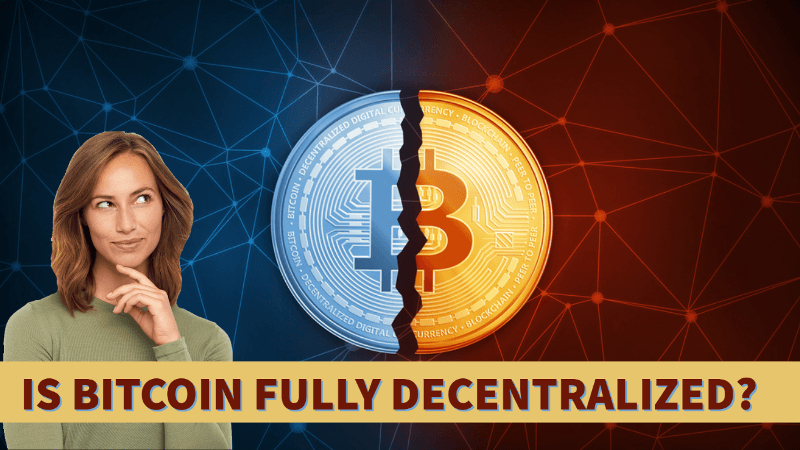Is Bitcoin Fully Decentralized?

Bitcoin is by far the most popular cryptocurrency in mainstream media. Part of the narratives that fuel its dominance is its perceived ability to thwart elements of centralization. An average crypto proponent will point to the cryptocurrency’s decentralized governance as one of the most compelling reasons why it has stood the test of time. However, there are reasons to question this sentiment. Although Bitcoin and several other cryptocurrencies have risen to prominence because of their perceived detachment from hierarchical structures, it is difficult to ignore the possibility of loopholes that could reduce the potency of such notions.
In light of this, I have decided to use this piece to explore the state of crypto governance and how it could determine the long-term viability of the crypto economy.
Is Decentralization A Myth?

It is easy to pick a majority of the components of cryptocurrency apart and pinpoint the technicalities involved in their operation. While this is true for the systemic functions of public blockchains, the same can not be said of their governance. Ever since Satoshi Nakamoto introduced Bitcoin, crypto governance has always emerged as a bone of contention. A majority of crypto proponents believe that decentralization is at the heart of crypto and blockchain technologies. As such, they possess the sort of governance ideal for individuals skeptical about the economic flaws of centralized systems.
However, more than ever, this notion has come under attack. Experts have begun to explore the real components of the governance frameworks of public blockchains as well as the potency of the decentralization narrative. A recent publication, authored by Andrew Singer, highlighted the prevailing arguments for and against the validity of crypto decentralization. In it, Singer cited a tweet by Lane Rettig, former Ethereum core developer, as an eye-opener to the existence of hierarchical structures in crypto networks. The tweet reads:

Lane Rettig, former Ethereum core developer
“Ethereum governance has failed. We are a de facto technocracy, where a small group of technocrats, the core devs, have final say over what goes into the protocol… But the challenges we face today are increasingly non-technical. Core devs don’t want to make these decisions because they feel unqualified, fear legal liability, are conflict avoidant, and prefer just to write code.”
Here, Rettig criticizes the governance of the Ethereum ecosystem, especially the size and expertise of individuals manning the development of the network. Apart from issues relating to the lack of inclusiveness exposed in this tweet, Rettig had unconsciously put the spotlight on the existence of a group of individuals responsible for the governance of the Ethereum blockchain. This statement gives some credibility to assertions challenging the prevailing assumptions that public blockchains rely on full decentralization. As argued in some quarters, blockchains are under the control of founders or development teams. For instance, Gavin Wood, co-founder of Ethereum told Cointelegraph Magazine:

Gavin Wood, co-founder of Ethereum
“The idea that ‘no one is in charge’ of either Bitcoin or Ethereum is fallacious. Vitalik [Buterin] is to all intents and purposes ‘in charge’ of Ethereum. The Ethereum Foundation (EF) controls its trademark, and he controls the EF.”
Like the Ethereum blockchain, the same skepticism trails Bitcoin, the model for a large percentage of cryptocurrencies. The cryptocurrency has its core software client, Bitcoin Core, which consists of individuals permitted to effect changes to the cryptocurrency’s protocol. A total of 5 individuals make up this elite group, named “maintainers.” Nonetheless, some have opined that the title is similar to that of a janitorial role. James Lopp, co-founder and CTO of Casa, explained that:

James Lopp, co-founder and CTO of Casa
“While there are a handful of GitHub “maintainer” accounts at the organization level that have the ability to merge code into the master branch, this is more of a janitorial function than a position of power… The question of who controls the ability to merge code changes into Bitcoin Core’s GitHub repository tends to come up on a recurring basis.”
He added in another interview that:
“During scaling debates, we often saw these different types of arguments clashing with each other. In general, I’d disagree with the characterization of debates as “domination” unless it’s being used to describe someone dominating a particular argument because the opposing side has done a poor job of defending their position with logic. At the end of the day, no one can force node operators to change the software they are running…”
How Decentralized Are the Development Protocols of Public Blockchains?

How Decentralized Are the Development Protocols of Public Blockchains
It is common knowledge that the governance of the Bitcoin ecosystem allows anyone to suggest code changes. But true decentralization is much more than letting network members propose changes freely. The real test for decentralization comes to play during processes involved in the acceptance or rejection of such changes. Do developers have equal chances of having their changes incorporated on the Bitcoin protocol? A recent article, authored by Sarah Rothrie and published on Crypto Briefing, aptly explains the intricacies involved in code contributions. The text reads:
“Bitcoin runs on open-source software called Bitcoin Core. In principle, anyone can contribute to the Bitcoin Core codebase, and there are a large number of developers who have provided code contributions. There is an unofficial hierarchy among Bitcoin Core developers based on the time that some have spent working on the protocol. The quality of these efforts is also taken into account. Developers such as Pieter Wuille or Gregory Maxwell, for example, have been involved with Bitcoin Core for many years and have committed a vast amount of code… While newcomer developers may struggle to get attention to their change requests, they can participate and earn a reputation by contributing their time and energy to reviewing and testing code from other developers.”
However, it is ridiculous to think that a network, regardless of its commitment towards decentralization, will accept inputs from unknown entities without proving their intentions. Hence, there is no way to ascertain the quality of updates proposed for the Bitcoin network and, at the same time, employ a fully decentralized protocol maintenance culture. As Daniel Resas, associate partner at German law firm Schnittker Möllmann Partners, explained, there are elements of bureaucracy in the governance of the Bitcoin network, particularly when it comes to transaction validation and important network updates. He asserted:

Daniel Resas, associate partner at German law firm Schnittker Möllmann Partners
“As a matter of fact, the protocol’s simplicity by design, which is also reflected in the absence of a formalized protocol governance regime, leads to centralized elements which are likely to be the only efficient way to come to reliable decisions in the context of major protocol updates which have a significant impact on the stakeholders crucial to the network’s stability. In other words, sometimes, especially in challenging situations such as the ‘inflation bug’ case in 2018, a smaller group is likely to be the more efficient ‘governing body’, even if this obviously constitutes a massive element of centralized network governance.”
Likewise, Gavin woods believes that this variant of benign dictatorship is present in the governance of the Ethereum blockchain. He declared:
“If he [Buterin] decides something regarding the mainnet protocol, then it’s unlikely that it won’t happen. If a protocol change is needed that he doesn’t appear to agree with, then it’s unlikely it will gain sufficient momentum to be successful. In reality, Ethereum is an opaque and largely benign dictatorship adulterated by a good dose of (mostly self-inflicted) chaos.”
Apart from Bitcoin Core’s governance, Sarah Rothrie also identified the possibility of an autocratic management style in matters relating to the supply of Bitcoin. According to her, the Bitcoin Core development team can override the 21 million BTC supply limit of the cryptocurrency. She noted that the possibility of this does not make it feasible since it is counterproductive to the growth of the network. Bitcoin has retained its appeal because its protocol adopts principles of supply and demand to ensure that it preserves its value. As such, the elimination of the network’s economic blueprint, which is heavily dependent on the scarcity of the coin, will force its price to fall drastically.
The Centralization of Crypto Mining

Furthermore, another aspect of governance that has generated lots of talking points centers around Bitcoin’s hash rate distribution. For a while now, pundits have highlighted the uneven distribution of Bitcoin’s hash rate as evidence of blockchain’s inability to avoid the concentration of power. This assertion is even more potent when we consider the growing influences of mining pools, with just three pools generating over 50% of Bitcoin’s hash power. However, some believe that the entrance of more mining pools capable of competing will lessen the risks associated with the centralization of Bitcoin mining. As expected, this sentiment has trailed the high-profile entry of Binance into the mining market.
According to Lisa He, the head of Binance Pool, the decision to actively participate in the mining sector is a calculated move to disrupt Bitcoin’s hash power distribution. She stated:
“By creating the Binance Pool, we’re aiming to change the distribution of hash rate across all the different mining pools and expect many users of the competing mining pools to transfer their hash rate to our platform. This will result in more decentralization, not less.”
Neeraj Khandelwal, the co-founder of India-based cryptocurrency exchange CoinDCX, reiterated this sentiment when he suggested that the emergence of Binance in the mining pool market is a viable step towards reducing centralization. He argued:

Neeraj Khandelwal, co-founder of India-based cryptocurrency exchange CoinDCX
“While it is true that the entry of large global exchanges to the mining sector will likely see them continue to dominate a part of the BTC mining industry globally, I believe that such concerns are potentially overblown. Binance entering the space may actually have the effect of increasing the level of competition we see between BTC mining pools — reducing levels of centralization.”
Nevertheless, the blockchain governance of the Ethereum blockchain is poised to take up a new framework once it finally executes its anticipated switch to the Proof of Stake (PoS) mechanism. Unlike the Bitcoin network that lets entities with superior computing power have substantial influences on the validation process of transactions, Ethereum is slowly drifting towards delegating authority to individuals with high staking power. And so, if we agree that decentralization on the Bitcoin network is far from perfect, then it is safe to conclude that a similar trope exists in the Ethereum ecosystem.
What About the Price of Crypto?
It’s common knowledge that some entities can, to an extent, influence the price movement of Bitcoin. Experts often link extreme volatile price movements to the actions of individuals, known as crypto whales, because they own huge volumes of cryptocurrencies. In her article, Rothrie explained that “the more BTC that any individual holds, the more influence they have on the price.” She added:
“As things stand, the distribution of Bitcoin is skewed towards “whales,” or individuals holding over 1,000 BTC. Currently, over 40% of all BTC is owned by people who fit that criterion. As things stand, the distribution of Bitcoin is skewed towards “whales,” or individuals holding over 1,000 BTC. Currently, over 40% of all BTC is owned by people who fit that criterion.”
Is It Possible to Evade Politics in the Governance of Crypto Networks?

Is It Possible to Evade Politics in the Governance of Crypto Networks
Lane Rettig raised a pressing issue in his tweet discussing Ethereum Foundation’s failure to enable a diversified and inclusive leadership model. A majority of development teams governing public blockchain mostly consist of engineers who have little or no knowledge about the fundamentals of politics. Although wealth, power, and identity come with governance systems requiring human inputs, the prevailing framework in the crypto space, the establishment of engineered governance solutions, and the distribution of power among stakeholders create new bureaucratic paradigms.
It is interesting to see how this model holds up in the next decade of crypto’s existence. If this type of governance manages to stand the test of time, it will prove that traditional hierarchical bureaucracy and politics are overrated. Lopp, in a statement describing his optimistic take on the lack of politics in crypto networks, explained that Bitcoin is leading new narratives that could change the way we view governance. He stated:
“The idea that we can remove politics from various aspects of our lives is incredibly appealing to me — by removing the impact of politics we can create more reliable platforms because we don’t have to worry about the rules being changed on a whim without our consent. Indeed, I believe Bitcoin is pioneering a new form of governance that inverts traditional hierarchical bureaucracies.”
